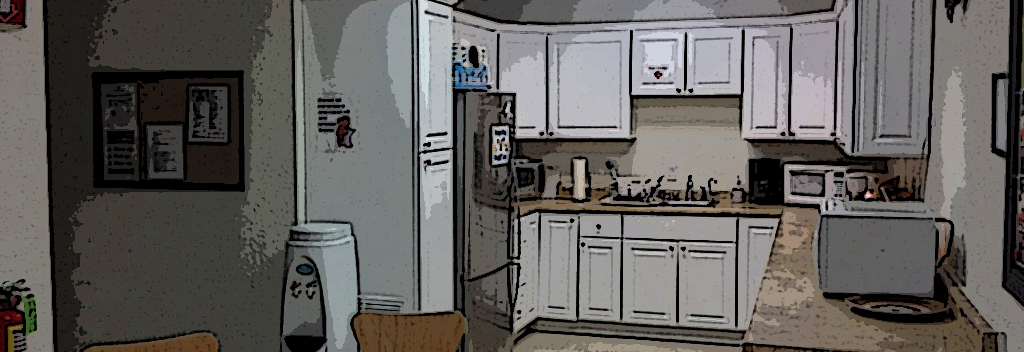THE
BREAK
ROOM

Engineers
enʹgi•neerʹing, n. 1. the practical application of science and
mathematics, as in the design of structures, roads and systems.
We asked our young engineers to write about their first jobs and their interviews. What they wrote should concern everyone in this business. When they told us these stories, particularly about interviews, we decided everyone needs to read them.
STEM is the latest buzz word in education. Science, Technology, Engineering and Math curricula have become cool. Encouraging young students to take classes in high school that will be useful in pursuit of college degrees in these areas is the new political talking point. We’re not sure how well that’s working at schools and colleges, but on the business side, there are some problems.
When the senior staff at Wheeler & Gray graduated from college, some had multiple job offers. Some of us picked where we wanted to work, interviewed there and were offered jobs. Whatever our paths were, what we were told about job and career prospects were mostly true. Today, not so much. There are many arguments about why that is. Immigration, work visas and multi-national companies are all hot topics. Those are necessary debates, but if someone is going to create acronyms, such as STEM, encourage young people to take advanced courses in high school and apply for difficult college majors, then the first thing we need to do is not discourage them from pursuing the career they want when they go looking for that first job.
When we interview, we don’t have a form, we don’t have canned questions and we don’t have a mold that we want a prospective employees to fit. Of course, we want certain experience, but we have no formula for the number of years. Design work in one office may be worth several years of experience at another office. Design engineering can be high stress and sometimes tedious. A successful employee must be resilient and resourceful. These same traits make good problem solvers, which is what we found in the three engineers who write about their job searches in the following paragraphs. Here’s what they wrote:
Engineers are problem solvers. It’s what draws us to engineering. It’s what our education trained us to do. For a graduate engineer, fresh out of school, the first problem to solve is usually to find a job as a design engineer. While our aptitude and education prepared us to find the best route for a reclaimed water line or plot the most efficient and safest roadway alignment, there was no class that taught how to navigate the route to that position as a design engineer. This chapter of The Break Room chronicles four new design engineers and their self-assigned task of solving their first real world problem: finding a job as a design engineer.
At first, it didn’t seem like a problem. The real world seemed to welcome us. High school counselors steered students toward engineering curricula. University professors said employers were waiting for us. The media parroted the latest hip acronym. STEM: Science, Technology, Engineering, Math. The highest rated television comedy tells the story of scientists and an engineer. Landing a job in this environment would be easy.
But we knocked on the doors of this industry,we encountered problems we did not expect. We found that despite what counselors, professors, the media and television characters said, jobs in design engineering seemed scarce, or at least reserved for those who got into the business years ago. The jobs that were offered were not in design or were for salaries far below industry standards or required qualifications that seemed to contradict the title of the position, such as an “entry level” position that required two years of experience.
The problems to overcome were daunting. Hundreds of candidates were vying for the same position. Job fairs were crowded shoulder to shoulder with fellow engineering graduates. Employers did not return calls or respond to letters with resumes attached. The number of potential employers seemed unlimited, but most were not looking for a design engineer.
So, what are you to do? Quit? Nope, like our education and training taught us and like our abilities had shown us, the key to solving this problem is the essence of solving any engineering problem. The solution was iteration. Here are our approaches to the problem.
 Adri
Adri
I graduated with my bachelor’s degree in 2012, hopeful about finding a career starting job in civil engineering. I sent out many resumes in the following months and received very few responses. I specifically wanted to do design work, but many “entry” level civil engineering design positions required up to two years’ experience and a vast knowledge of AutoCAD. Some even wanted a P.E. It was three months after graduation and the only position I could find was a part-time construction administration job. It was not ideal, but I felt I could get my foot in the door and use the experience to network within the industry. I was working part-time as an office assistant and part-time as a barista. When I was hired, I was told that I could move up to an office engineer when an opportunity came up. It took a year for an office engineer position to come up. All the while, I continued looking for design work.
After working in construction management for 2.5 years, I knew it was not my calling. I decided to leave San Francisco, where I had been living since starting college, and move back to Los Angeles. My dad had bought a lot and wanted to build a house. He asked me to come and help him with the design and permitting. This gave me the opportunity to start working on a project from the ground up, gain design experience, and work with city plan reviewers who were checking my drawings. Once I began working on this project, I knew it was my ticket into civil engineering. I brought the plans with me to every interview. For the most part they went well, but I was still having trouble getting away from construction management. I was about to take a construction management position when I got a job offer at Wheeler and Gray. They understood that my experience working on a job site would be a strength in the office.
 Gary
Gary
I had a head start on experiencing the difficulty of job hunting in a competitive field. I wanted to become a building inspector and work my way up to plan checking, so in 2006 I earned a 2-year Associate’s degree in Building Inspection and became certified as a Residential Building Inspector. My college professors predicted a lot of job openings because mass retirements were underway; however, I had a lot of trouble finding openings or getting interviews. The economy had begun its downward trend and many people continued to work after they were eligible for retirement. Still set on breaking into the construction field, I decided to pursue a Civil Engineering degree.
History repeated itself after I graduated in 2012. Entry-level job openings were scarce and, oddly, required years of experience. I applied for over 100 positions, but could only land tangential jobs, such as estimating and surveying. The job experience seemed like it was valuable, but there was no advancement in the careers or salaries and the experience gained didn’t lead to more or different interviews. A few employers were searching for civil engineering graduates, but the positions they offered weren’t for civil engineering. After sitting through several interviews it became clear that they would move my career sideways instead of forward. One position was providing phone support for overhead lights. After I finally started receiving calls from civil engineering firms, I thought I had seen it all.
Interviews with the civil engineering firms were their own brand of insanity. Several asked about my marital status and were disappointed that I wasn’t married (“We’re a family company, first and foremost”). One engineer gave me a hard time about my height (“Engineers need to have a large presence on the job site”). Another was desperate to train a replacement (“I’m in a rush to move onto greener pastures”). These truly unusual interviews didn’t sway me from my job pursuit. And despite the odd interviews, the majority of my interviews went well even though I didn’t have what they were looking for. Roughly half of my interviews came from firms on the east coast and were done via phone or webcam and, despite my willingness to relocate immediately, those positions were given to local interviewees. I called back several local firms and asked for more information on why I wasn’t selected, and they all said that their entry-level positions were being filled by licensed engineers. Luckily, because of my education and experience, I knew how to calculate a street grade or I wouldn’t have even landed a surveying job. Eventually, I was offered a job where I use what I learned in college and by gathering experience. If not for my own knowledge, and a little bit of luck, I may not have been able to break into the world of engineering.
 Chris
Chris
After graduating college, I took some time off before applying for jobs. During that time, there were not very many entry level positions. Some positions required extra licenses or certificates, software programs that I never heard of, or minimum 2 years’ experience for an entry level position. I applied to about 100+ companies, even companies out of state.
As time passed by, I was looking at alternatives. Should I still pursue an engineering career? As time is passing, my chances of finding an engineering position were growing smaller. I thought about changing careers, even getting a master’s degree in a different field or going back to school to get certificates. The challenge of that would be finding a job with an engineering background or being over qualified.
I came across a friend who asked me if I was interested in obtaining a general building contractor’s license. This was my turning point. With this license, I was exposed to construction, business management, and working with clients. Qualities that I know will help me with my career. Although it wasn’t engineering, it was still the same industry.
